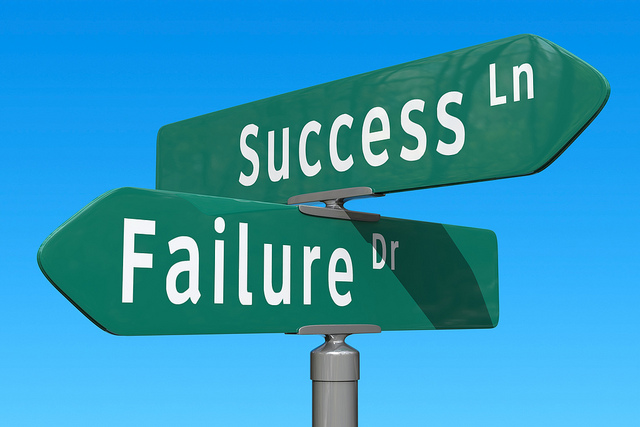
“If you want to live a happy life, tie it to a goal, not to people or things.” ~ Albert Einstein
On the first day of the year, I like to spend time alone and reflect on myself, my actions towards the goals of last year and to see if I have changed or, at least, created some momentum to change.
After all, we are goal-setting machines.
Our growth is served not only by achieving goals, but by who we become when we proceed faithfully towards them. And so it’s imperative that we reflect on what worked and what didn’t in the past year.
Almost six out of 10 resolutions fail in the first week alone, and approximately 48 percent of corporate goals are abandoned after only three months.
So the point is not if we will fail, but when we will fail.
Why is it that many of us don’t stay true to our goals and fail to make any lasting change? Why do we not lose the 20 pounds we promised ourselves we would? Why don’t we put that extra money in a savings account as we intended to?
It’s true that self-discipline is key and without it, most goals are unachievable. But there are also several other reasons why our goals often last for only a few weeks.
1. The word “goal” is loaded and overwhelming.
I’ve found that the word “goal” in itself is heavy and ladened with so many expectations. It represents a tired universal concept that adds so much stress to our lives. It implies that in not achieving it, we are failures.
Recently, I’ve started to use the word “intention” as it allows me to think that even if I create some momentum towards it—without achieving it—then I’m still successful.
I set an intention to write an e-book last year and I couldn’t do it. However, I’ve made meaningful progress towards writing it and learned a few things on the way to be able to get it done this year. So I don’t feel like a failure just because I didn’t finish the book.
2. Our reflections are not deep enough.
When reflecting on the past year, it’s important that we scrutinize both successes and failures. We must understand the reasons why we didn’t achieve our intentions and appreciate that it could be something we were not yet ready for.
We must be weary of our ego pushing us to do something, and realize that in the greater scheme of things, it wasn’t the right time or the right match for us. I had set a goal to run the New York City marathon, but my body hadn’t recovered from the previous year’s injuries. Every time I completed a long run, I would completely break down, causing me much pain and disappointment.
If I had been honest with my reflection, and knowing the condition of my knees, then I wouldn’t have set such an intention. It doesn’t mean I’ve given up on my dream to run a marathon, but I must first rehabilitate my knees.
3. Our goals/intentions are not relevant to us.
Our culture has become inundated with achievement, success and the spoils of it all. We often set intentions for the sake of it, and bucket lists have become a way to compare our happiness and contentment in life with the next person.
We can reduce the stress we put on ourselves by choosing what is relevant to us, rather than what is in vogue. What’s the point of climbing Mount Kilimanjaro if it means nothing to us? Why take up yoga just because all of California is doing so?
When we ask ourselves why we are pursuing our goal or intention, and the reason makes us giddy and excited, then it means we are on the right track. And when we view our life as an 80-year project rather than a short-sighted view of 12 months, we start to choose fewer and more meaningful things to do and achieve each year.
In 2015, I intended to learn Tai Chi, Pilates and run a marathon—I ended up doing none. Instead, I should have asked myself why I truly wanted all of them and if I still wanted them, then choose only one to achieve per year.
4. We don’t set enough spiritual goals/intentions.
Spiritual intentions can include controlling our angry outbursts or waking up every day and putting a smile on at least one person’s face. Gabrielle Reece, former model/professional volleyball player, stated in an interview that she had set an intention long ago to “Go First,” meaning she would greet, smile and approach anyone she came across before they did.
These intentions are more difficult and often hard to gauge, but they nourish the soul and as such, lead to lasting change. They improve our attitudes, mindsets and the way we interact with the world. They make us better people and so we find achieving all our other intentions much easier to do.
Last year I decided that I wanted to have more peace and solitude in my life. I started rising an hour earlier each day to have some time on my own. I can honestly say it’s one of the best things I’ve ever done. It has helped me achieve many of the other intentions I’ve set.
5. We don’t define and plan the actions needed to meet an intention.
The whole point of setting goals is to take action. Without a clearly defined action plan and a set schedule, we are doomed to fail. The intentions are the one percent inspiration we need, while the actions are the 99 percent perspiration we have to have.
It’s important to block out specific time in the calendar for doing the required work to achieve our intentions. I’ve marked my calendar with three sessions of writing per week, each lasting three hours. I know if I remain true to those actions, I will not only achieve my desired outcome, but will also increase the amount of contentment in my life.
Whether we call them goals, intentions or New Year’s Resolutions, it’s important to have some clarity on how we will spend the next minute, the next day and the next year.
We can simplify this process, or complicate it, but the bottom line is that we have an inner-need to effect lasting change within ourselves and grow every minute, every day and every year.
Relephant read:
Winning Our Failures.
Author: Mo Issa
Editor: Nicole Cameron
Image: Chris Potter/Flickr


 Share on bsky
Share on bsky




Read 0 comments and reply